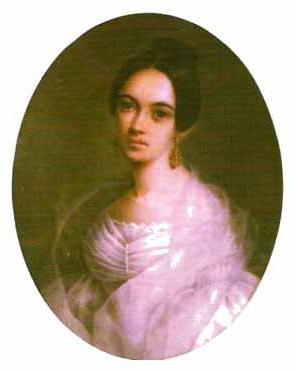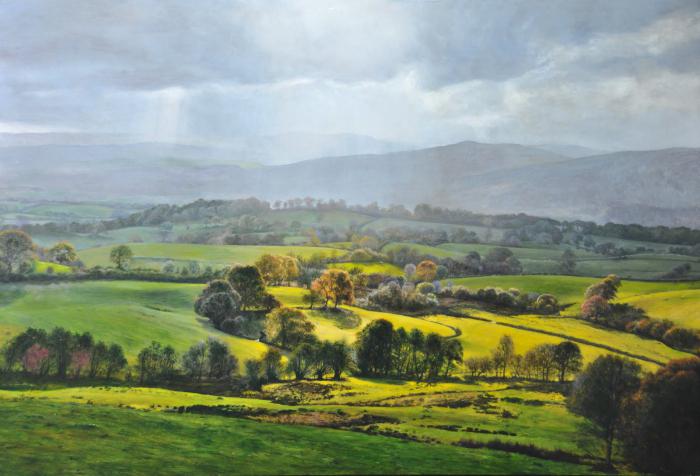Lermontov's poetry is a real iceberg, the study of which can be engaged for many years and not be understood to the end of all its depth and strength of talent of our great compatriot. No matter how blasphemous this may sound, but, according to many critics, Lermontov was more talented than Pushkin. More precisely, in Mikhail Yuryevich the poetic gift is presented in a more concentrated, rich manner than in Pushkin, Lermontov’s main idol.
The first stages of comprehension
The most
famous poems of Lermontov are part of our reading gradually, thanks to the lessons of Russian literature. In the 5th grade, this is the famous "Borodino", which is happy to memorize children by heart. Children read with interest the description of the battle, enthusiastically get acquainted with new words-historicisms, introducing into their lives until now unknown realities. Easy, laid-back, confidential intonation, alternation of three- and
four-foot iamba cause a feeling of friendly conversation, dialogue, create the effect of the presence of the author next to the reader. The patriotic idea of the work, revealed in the images of Borodin, finds the most lively response among students. It essentially characterizes the poet himself, who loves his homeland "to the pain of the heart." Therefore, other well-known poems by Lermontov, criticizing the socio-political system of Russia, do not erase this our initial idea of the poet as the true son of the Russian land.
As part of the school curriculum
The baton in the patriotic lyrics of Mikhail Yuryevich takes a small in size, but surprisingly capacious in content masterpiece, which is already familiar to sixth graders - the poem "Clouds". It, like Lermontov’s other famous poems, contains everything that is inherent in his poetry: restlessness of loneliness, and yearning for freedom of internal and external, independent homeland, if possible, live not in a foreign land, but where the soul calls. After all, the poet himself was an “eternal wanderer,” whom fate threw from one exile to another, from the “dear north” to the Caucasus, which became the place of his death.
“The Lone Sail Whitens” - no less famous poems by Lermontov. The work is imbued with the romance of struggle and feat, heartfelt confusion and striving for the beautiful far away. Poems excite the imagination of adolescents, give rise to as yet unclear dreams of a wide expanse of life, a free wind, salty sea spray in the face and a feat that is still unknown, incomprehensible, but so beautiful!
The struggle of the senses

The inexhaustible world of Mikhail Yurievich's poetry has incorporated all spheres of our emotional life. Lermontov’s poems about love are a clear proof of this. We know that Pushkin was happy in friends, in sincere warm affection. And many women, bright, brilliant, beautiful and educated, loved him, admired him, kept a reverent memory of him. The poet to whom this article is devoted is another matter. Almost all of Lermontov’s poems about love are tragic. One of the very first, addressed to Ekaterina Sushkova, has a speaking name - "Beggar". The lyrical hero, in which the poet himself is easily recognized, compares his feelings and experiences, the bitterness of deceived hopes with the pain of an unfortunate beggar, who put a stone in his outstretched hand instead of a piece of bread. Varenka Lopukhina, Marie Shcherbatova, Katya Bykhovets - these are the muses that inspired Lermontov to create immortal lines, now full of sorrow, sometimes touching tender and humble, sometimes full of hope that could not come true.
"... Then my soul's humility is humbled ..."

Lermontov’s poems about nature are a special topic. Mikhail Yuryevich has almost no purely landscape lyrics. A philosopher poet, he also saw the living soul of being in sketches of the surrounding nature. Rebellious and restless, standing in irreconcilable opposition with all the gloomy, gray, faceless, spiritless that was in Russia and in contemporaries, Lermontov, on the one hand, could only be alone with nature, experiencing enlightenment, purification, sincere joy. Remember the last lines of the poem "When the yellowing cornfield is worried ..."? A lyrical hero in heaven sees God, dumps the burden of worries and anxieties from the soul precisely when he is in the lap of nature, where everything is harmonious and beautiful - alas, not at all like in the world of people. This sharp contrast, this chasm between the perfection of God’s world, the greatness of God’s plan, which created the Earth and all living things, and the world of human relations, mired in crimes, lies, artificiality, immorality permeates yet another piercing-lyrical, unusually beautiful and piercingly sad piece: elegy "I go out alone on the road ...". The beauty of starry night is a sharp dissonance in comparison with those thoughts that overwhelm the hero. No wonder he wants to forget and fall asleep in order to forever abandon the imperfection of human life.
Sun of autumn
Autumn was praised in the works of many of our poets. Pushkin himself admitted that of the seasons he was glad "only to her," calling him "charming eyes." Poems about Lermontov’s fall are also filled with a trembling delight of a person who is attached to the highest mystery - the mystery of nature. The sunny reflections of the last fine days are compared by the poet with the secret sadness of
unrequited love. And he called himself more than once an “oak leaf,” which was torn off by the autumn wind from its native branch and carried off into the distance by everyday storms. The rebellious, ardent, striving toward the mountain heights of the poet on the wings of time flies to us, the current generation of readers, to introduce us to the great miracle - Russian classical literature.